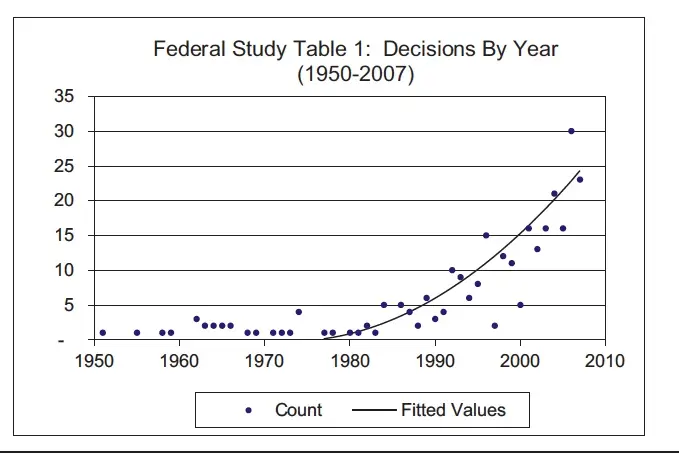3 Things You Must Learn From a Survey of 358 Trade Secret Cases
 A recent survey of over Statistical Analysis of Trade Secret Litigation in State Courts (from 1995-2009) has some great nuggets for every software or SAAS company looking to protect its SAAS trade secrets and software trade secrets (something you should be doing, by the way). Without going into the legal nitty gritty (which I know you want me to skip), here are 3 takeways (after I define ‘trade secret’).
A recent survey of over Statistical Analysis of Trade Secret Litigation in State Courts (from 1995-2009) has some great nuggets for every software or SAAS company looking to protect its SAAS trade secrets and software trade secrets (something you should be doing, by the way). Without going into the legal nitty gritty (which I know you want me to skip), here are 3 takeways (after I define ‘trade secret’).
 So, please think about this, as if you are not taking ‘reasonable measures‘ to protect your trade secrets then good luck trying to stop an ex-employee or business partner from wrongfully taking or using them. Think about this folks, as these may be the keys to your castle!!
Resources:
Here is the law review article with the survey (assuming you have time to read it) Trade Secret Case
Practical Definition of a Trade Secret from the US Dept of Labor Link
Disclaimer: This post is for informational and educational purposes only, and is not legal advice. Hire an attorney if you need legal advice.
So, please think about this, as if you are not taking ‘reasonable measures‘ to protect your trade secrets then good luck trying to stop an ex-employee or business partner from wrongfully taking or using them. Think about this folks, as these may be the keys to your castle!!
Resources:
Here is the law review article with the survey (assuming you have time to read it) Trade Secret Case
Practical Definition of a Trade Secret from the US Dept of Labor Link
Disclaimer: This post is for informational and educational purposes only, and is not legal advice. Hire an attorney if you need legal advice.
 A recent survey of over Statistical Analysis of Trade Secret Litigation in State Courts (from 1995-2009) has some great nuggets for every software or SAAS company looking to protect its SAAS trade secrets and software trade secrets (something you should be doing, by the way). Without going into the legal nitty gritty (which I know you want me to skip), here are 3 takeways (after I define ‘trade secret’).
A recent survey of over Statistical Analysis of Trade Secret Litigation in State Courts (from 1995-2009) has some great nuggets for every software or SAAS company looking to protect its SAAS trade secrets and software trade secrets (something you should be doing, by the way). Without going into the legal nitty gritty (which I know you want me to skip), here are 3 takeways (after I define ‘trade secret’).
Q: What is a Trade Secret?
A: Long story short, a trade secret is a business secret that gives you a competitive advantage by remaining secretive.
- The owner must prove that it took ‘reasonable measures’ to keep it a secret (if you do this then the law (by statute) will give you some great protection and legal remedies). Examples of trade secrets: source code, customer lists, business and strategy plans, and employee lists.
1) WHO are the Most Common Misappropriators (i.e. people that take your trade secrets without your permission)?
- Employees
- Business Partners
2) What do They Usually TAKE?
- General business information (e.g., customer lists)[litigated 70% of the time], and
- Technical business information (e.g., software) [litigated 30% of the time].
3) What are the Best Ways to PROTECT your Trade Secrets?
- Confidentiality Agreements,
- Computer and Physical Protections (e.g., passwords or restricted access), and
- Confidentiality Education and Restrictive Markings (marking things as ‘confidential information of [your company],’ ‘internal use,’ ‘trade secret,’ etc.).
 So, please think about this, as if you are not taking ‘reasonable measures‘ to protect your trade secrets then good luck trying to stop an ex-employee or business partner from wrongfully taking or using them. Think about this folks, as these may be the keys to your castle!!
Resources:
Here is the law review article with the survey (assuming you have time to read it) Trade Secret Case
Practical Definition of a Trade Secret from the US Dept of Labor Link
Disclaimer: This post is for informational and educational purposes only, and is not legal advice. Hire an attorney if you need legal advice.
So, please think about this, as if you are not taking ‘reasonable measures‘ to protect your trade secrets then good luck trying to stop an ex-employee or business partner from wrongfully taking or using them. Think about this folks, as these may be the keys to your castle!!
Resources:
Here is the law review article with the survey (assuming you have time to read it) Trade Secret Case
Practical Definition of a Trade Secret from the US Dept of Labor Link
Disclaimer: This post is for informational and educational purposes only, and is not legal advice. Hire an attorney if you need legal advice. 